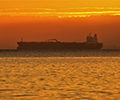

Iran denied its alleged involvement in a deadly drone attack on an oil tanker off the coast of Oman, state television reported Aug. 1, as the US and Israel discussed “the appropriate next steps” following the July 29 incident.
“First of all, the illegitimate existence of the occupier regime should stop making accusations. This is not the first time for such allegations against the Islamic Republic,” foreign spokesman Saeed Khatibzadeh was quoted as saying by state TV.
Israel’s prime minister Naftali Bennett blamed Iran for the drone attack on vessel Mercer Street that killed two people amid heightened risk to shipping in the region after a series of incidents targeting oil tankers and ships dating back to 2018.
“These comments are definitely condemned. Anyone who plants wind, they will reap storm and the Islamic Republic will not hesitate a moment to defend the Iranian people’s interests and national security,” Khatibzadeh said.
The unladen oil products tanker Mercer Street was heading to Fujairah in the UAE to load diesel over the weekend for delivery into East Africa at 130 Worldscale points for a trading company.
Appropriate steps
Zodiac Maritime, the Israel-controlled operator of the vessel, said that two crew members — from Romania and the UK — died as a result of the incident.
The Liberian-flagged Mercer Street — which has a deadweight of 49,992 mt — was traveling from Dar es Salaam in Tanzania.
Al Alam, Iran’s Arabic-language satellite news channel, cited a report on July 31 that the Shiite-led, anti-Israel Resistance Front has described the attack as a “retaliation against recent Israeli air strikes in Syria and martyrdom of two people.”
US Secretary of State Antony Blinken spoke with Israeli Foreign Minister and Alternate Prime Minister Yair Lapid on July 31 to discuss the attack, State Department spokesperson Ned Price said in a statement.
“Secretary Blinken and FM Lapid discussed the attack on the Mercer Street, a commercial ship which was peacefully transiting through the north Arabian Sea,” Price said. “They agreed to work with the United Kingdom, Romania, and other international partners to investigate the facts, provide support, and consider the appropriate next steps.”
Houthi attacks
The U.S. 5th Fleet, which is based in Bahrain, patrols the waters of the Gulf region, with its area of operations encompassing about 2.5 million square miles of water that includes the Arabian Gulf, Gulf of Oman, Red Sea and parts of the Indian Ocean, according to its website. The expanse is made up of 20 countries and includes three key choke points at the Strait of Hormuz, the Suez Canal and the Strait of Bab al Mandeb at the southern tip of Yemen.
The Mercer Street incident also follows a spate of attacks and attempted strikes on Saudi Aramco’s infrastructure by the Iranian-aligned Houthis in Yemen.
On July 27, Saudi forces intercepted an attack on the Red Sea city of Jazan, which Yemen’s Houthi militants targeted with ballistic missiles and booby-trapped drones. The location is home to the 400,000 b/d Jazan refinery project, which is in the process of ramping up. It is expected to reach full production by mid-2022. It had previously been expected to be fully operational at the end of 2019 but has suffered delays.
In a similar incident, Lori, an Israeli-owned container ship, was attacked in the Arabian Sea on March 25.
Source: Platts